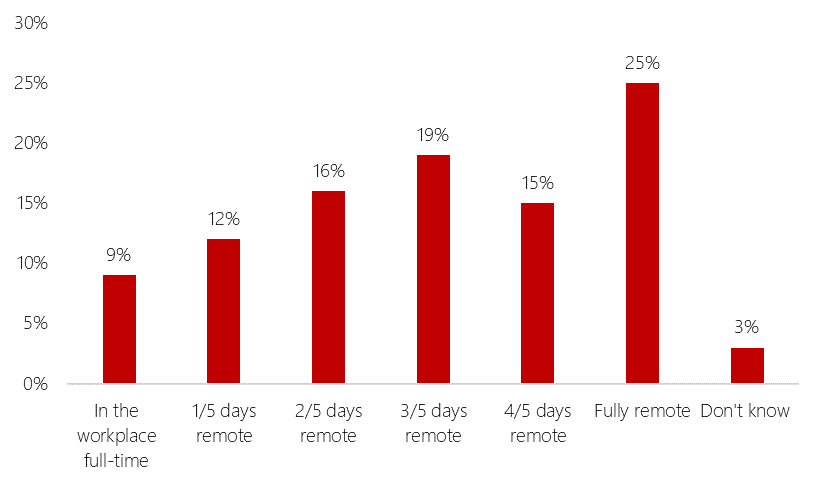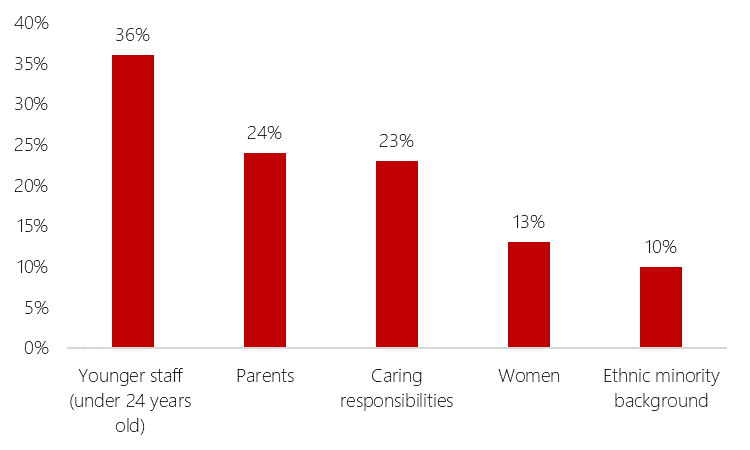Making hybrid inclusive: new research establishes key priorities for employers and policymakers
Posted on
 © Photo by Marcus Aurelius from Pexels
© Photo by Marcus Aurelius from Pexels
Nearly 9 in 10 workers don’t want to return to pre-Covid working patterns, according to new research into the impact of hybrid working, conducted by the Work Foundation and the Chartered Management Institute (CMI).
This research indicates that without improvements in management attitudes and behaviours and a more proactive approach to planning and support, this new model could present distinct challenges for some worker groups, including disabled workers, parents, and those with caring responsibilities.
This research draws on surveys of 964 managers and 1,000 remote workers, and additional engagement with frontline advice services. It has informed the development of a practical guide for employers and a briefing for policy makers.
While some workers are benefitting from a shift to hybrid, others are facing new challenges
Employees are generally keen to continue working remotely at least some of the time, with 88% of workers surveyed saying that they would like to work remotely between one and five days a week.
Figure 1: Proportion of the week that employees want to continue working remotely

Source: CMI/Work Foundation survey of 1,000 employees
Managers are aware of the benefits remote working brings, with the largest proportion of managers identifying positive impacts for parents (49%) and carers (43%). Furthermore, evidence from our employee survey finds that disabled workers are 1.3 times more likely than non-disabled workers to be working remotely (57% compared with 44%) and that working remotely was valuable to disabled workers as it allowed them to better manage their energy or their condition.
Nevertheless, working from home can mean reduced visibility in the workplace which may result in different rates of progression for some workers. This could affect those who may already face disadvantage as a result of structural inequalities in the workplace and who may be more likely to work remotely, such as disabled workers. Managers themselves highlight concerns about staff missing out as a result of hybrid working - particularly younger staff (under 24 years old), women and those with caring responsibilities.
Figure 2: Proportion of managers concerned that hybrid working could limit workplace opportunities for specific worker groups

Source: CMI/Work Foundation survey of 964 managers
Manager behaviour and decision making can be pivotal in enabling or limiting access to hybrid and flexible work
Our survey of managers revealed that more than half of managers currently have the power to decide which employees can work remotely (55%), when staff should be present at the office (63%), working time during the day (53%) and expectations for staff responsiveness (53%).
Furthermore, one in five (20%) employees whose line managers make the decision for them are not happy with their working arrangement. More worryingly, only 59% of workers whose line manager has formal decision-making powers over remote working requests are comfortable to ask to work remotely.
More than half of employees surveyed (54%) indicate that their line managers’ support was the main reason they were comfortable in asking for remote working. Line manager support for remote working is considered particularly important by disabled workers, with 61% of disabled workers indicating they felt comfortable asking for remote working because their line manager was supportive of it.
Conversely, legacy attitudes towards remote working and what it means for career development may persist, which presents a real risk for those who do pursue hybrid options. Our employee survey found the main reasons why workers felt uncomfortable asking to work remotely were insufficient senior staff support (29%) and line managers not working remotely themselves (28%).
This shows line manager and senior staff behaviour can play a key role in lowering barriers of access to remote work.
Making hybrid inclusive: next steps
The recent announcement from the Government, that every employee will be given the right to request flexible working from their first day in the job, is a positive step in the right direction. Lowering barriers for people to request remote working is essential particularly for disabled workers, for whom access to this form of flexible work can be central to their ability to manage their condition and remain in work.
Government should take this agenda further, developing an employer campaign and accreditation programme to promote inclusive flexible working practices, and making flexible working the default position for all employees, with flexible options included in all job adverts, unless employers have a sound business reason for an exemption.
Employers too should proactively address these challenges to avoid rolling back on progress made towards greater inclusion in the workplace, by consulting with staff to develop an approach to remote and flexible work, and ensuring managers are adequately trained and prepared to manage hybrid teams and role model hybrid working.
Organisations should also develop action plans around hybrid and remote working which prioritise diversity and inclusion. This could include monitoring the take-up of flexible work among staff by characteristics including gender, age, disability, sexuality and gender identity, and developing mechanisms to embed flexibility into the working arrangements of all staff.
Disclaimer
The opinions expressed by our bloggers and those providing comments are personal, and may not necessarily reflect the opinions of Lancaster University. Responsibility for the accuracy of any of the information contained within blog posts belongs to the blogger.
Back to blog listing

